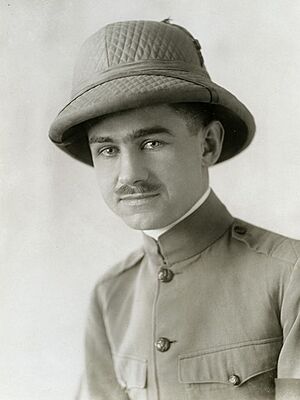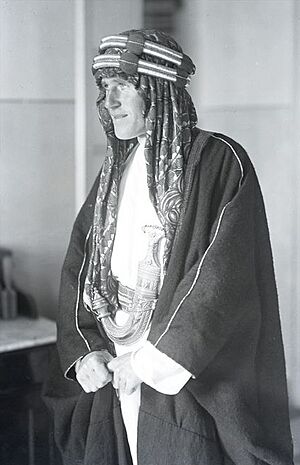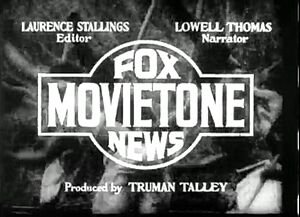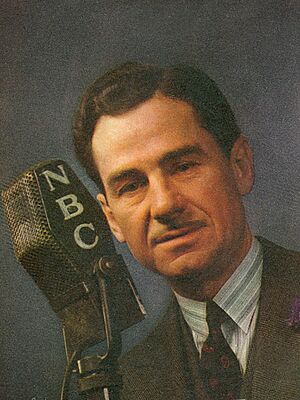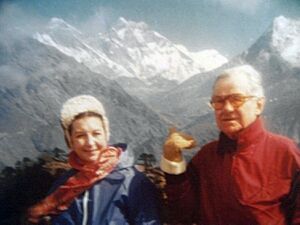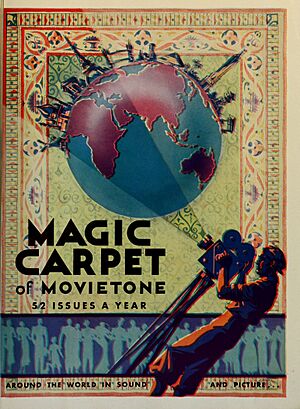Lowell Thomas facts for kids
Quick facts for kids
Lowell Thomas
|
|
|---|---|
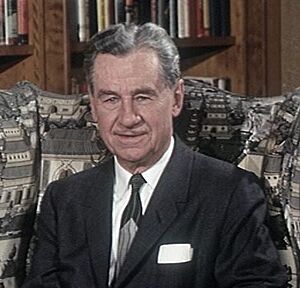
Lowell Thomas, c. 1966
|
|
| Born |
Lowell Jackson Thomas
April 6, 1892 Woodington, Ohio, U.S.
|
| Died | August 29, 1981 (aged 89) Pawling, New York, U.S.
|
| Alma mater | Valparaiso University University of Denver Princeton University |
| Occupation | Writer, broadcaster |
| Employer | Chicago-Kent College of Law |
| Spouse(s) |
Frances Ryan
(m. 1917; died 1975)Marianna Munn
(m. 1977) |
| Children | Lowell Thomas Jr. |
Lowell Jackson Thomas (born April 6, 1892 – died August 29, 1981) was an American writer, broadcaster, and world traveler. He is best known for making T. E. Lawrence, also called Lawrence of Arabia, famous. Lowell Thomas also helped promote Cinerama, a special movie system that used a huge curved screen.
Contents
Early Life and Education
Lowell Thomas was born in Woodington, Ohio. His father was a doctor, and his mother was a teacher. In 1900, his family moved to Victor, Colorado, a town where people mined for gold. Young Lowell worked there as a gold miner, a cook, and even a reporter for the local newspaper.
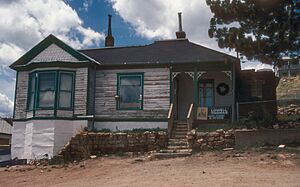
In 1911, Lowell finished high school in Victor. The next year, he earned a science degree from Valparaiso University. A year later, he received two more degrees from the University of Denver. He then started writing for the Chicago Journal newspaper. From 1912 to 1914, he also taught public speaking at Chicago-Kent College of Law. After that, he went to Princeton University in New Jersey, where he earned another master's degree in 1916 and continued teaching public speaking.
A Career of Adventure
Lowell Thomas was very good at promoting himself and his work. He convinced railroad companies to give him free train rides. In return, he wrote articles praising train travel. When he visited Alaska, he got the idea for travelogues. These were movies about exciting faraway places. When the United States joined World War I, Lowell went to Europe to report on the war.
Meeting Lawrence of Arabia
Lowell Thomas filmed amazing scenes of T. E. Lawrence, a British officer who became famous for his role in the Arab Revolt. After returning to America in 1919, Thomas began giving public talks about the war in Palestine. His shows included exciting movies of Arab people, camels, and daring Bedouin fighters.
His lectures were incredibly popular, drawing huge crowds. He became very famous across the country. He even took his show to Britain, performing at famous venues like Covent Garden in London. Many important people attended his shows.
Lowell Thomas truly admired Lawrence. He continued to defend Lawrence's reputation against any criticism. After Lawrence's death, Thomas even wrote a part for a book called T.E. Lawrence by his Friends.
Movies and Cinerama
During the 1920s, Lowell Thomas worked as a magazine editor. But he always loved movies. For many years, he narrated Movietone News newsreels, which were short films shown in theaters before movies. He also provided the voice for many other short film series, like Lowell Thomas' Magic Carpet of Movietone.
Later, Thomas joined forces with other filmmakers to develop Cinerama. This was a special movie system that used three projectors and a huge, curved screen. It also had amazing seven-channel surround sound. He produced several documentaries using this new system, including This is Cinerama (1952), Seven Wonders of the World (1956), and Search for Paradise (1957).
Radio and Television News
Lowell Thomas first started on radio in 1929, giving talks about his travels. In 1930, he became the host of the Literary Digest program. At first, he told stories about his own adventures. But soon, he began sharing interesting news stories about other people. His show became a daily program and moved to the CBS Radio network.
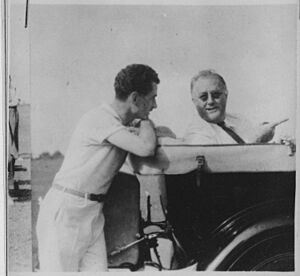
Lowell Thomas was not directly employed by the radio networks. Instead, he worked for the show's sponsor, Sunoco. He even hosted the very first television news broadcast in 1939. On February 21, 1940, he began the first regularly scheduled TV news show. This was a live broadcast of his radio show, shown on television.
In 1940, Thomas anchored the first live TV broadcast of a political convention, the Republican National Convention. He was in a New York studio, identifying speakers at the convention for the few thousand people who owned a TV set. In April 1945, he even flew in a P-51 Mustang plane over Berlin during a battle, reporting live on the radio.
Lowell Thomas preferred radio over television. He continued to present and comment on the news over the radio for four decades, until he retired in 1976. This was the longest radio career of anyone at that time. His famous opening line was "Good evening, everybody," and he would sign off by saying, "So long, until tomorrow."
Personal Life
Lowell Thomas' first wife, Frances, often traveled with him on his adventures. She passed away in 1975. In 1977, he married Marianna Munn. For their honeymoon, they took a 50,000-mile trip, visiting many of his favorite places around the world.
Lowell Thomas died at his home in Pawling (village), New York in 1981. He is buried in Christ Church Cemetery. Marianna passed away in 2010.
Awards and Legacy
Lowell Thomas received many awards and honors throughout his life:
- In 1945, he won the Alfred I. duPont–Columbia University Award.
- In 1971, he received the Golden Plate Award from the Academy of Achievement.
- In 1973, he was honored at the Peabody Awards.
- In 1976, President Gerald Ford gave him the Presidential Medal of Freedom, one of the highest awards a civilian can receive in the U.S.
- He has two stars on the Hollywood Walk of Fame.
Lowell Thomas was also inducted into many Halls of Fame:
- 1966 National Ski Hall of Fame
- 1977 National Association of Broadcasters
- 1978 Colorado Ski and Snowboard Hall of Fame
- 1989 National Radio Hall of Fame
- 1992 National Aviation Hall of Fame
- 2018 Laurentian Ski Hall of Fame
Several things are named after him, including the Thomas Mountains in Antarctica and a museum in Victor, Colorado. Awards from various organizations, such as The Explorers Club, are also named in his honor. The communications building at Marist College in New York is named for him, and his personal archives are kept there.
Works
Filmography
Director
- With Allenby in Palestine and Lawrence in Arabia (1918)
- Out of This World (1952)
- High Adventure with Lowell Thomas (1957–59)
Narrator
Lowell Thomas narrated many films, including:
- Africa Speaks (1930)
- Movietone News (1932–52)
- Mussolini Speaks (1933)
- Lowell Thomas' Magic Carpet of Movietone (1933–43)
- Going Places with Lowell Thomas (1934–38)
- This is Cinerama (1952)
- Seven wonders of the world (1956)
- Search for Paradise (1957)
Subject
Lowell Thomas was the subject of these films:
- Yesterday's witness: a tribute to the American newsreel (1977)
- Lowell Thomas: Man About the World (2000)
- Lowell Thomas: American storyteller (2008)
- The Voice of America: Lowell Thomas and the Rise of Broadcast Journalism (2019)
 | Roy Wilkins |
 | John Lewis |
 | Linda Carol Brown |


